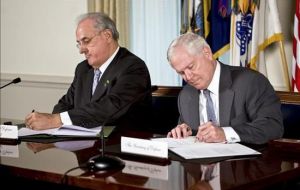MercoPress. South Atlantic News Agency
Brazil signs in the Pentagon wide ranging defence cooperation agreement
 Brazilian Defence Minister Nelson Jobim and US Secretary of Defence Robert Gates
Brazilian Defence Minister Nelson Jobim and US Secretary of Defence Robert Gates Brazil and United States signed a military cooperation agreement Monday in the Pentagon, Washington that both sides underlined as an example of partnership and transparency for the Americas.
The defence pact, the first between the two nations since 1977, opens the door to more interchange on research and development, logistics support, education and training, and the acquisition of defence products and services.
It comes as US Defence Secretary Robert Gates sets off on a tour of Latin America, including visits to Colombia, Peru, and the Caribbean – seen as part of a broader effort to strengthen ties with allies, as well as shore up support in a region that supports Iran and has made increasing arms purchases from Russia.
“Brazil is going to get recognition, and that is very important. Future wars are going to be as much about the management of information and intelligence as they are about armaments. And Brazil doesn’t know how to do that. The US is the perfect country to help us minimize that risk,” says Fernando Arbache, an anti-terrorism expert in Sao Paulo who teaches at Brazil’s Naval Headquarters. “With this accord Brazil is aligning itself strategically with the US, like the European nations have done with NATO.”
Secretary Gates and Brazilian Defence Minister Nelson Jobim signed the cooperation agreement on the sidelines of the nuclear summit held in Washington. It’s the first such agreement since a1952 cooperation accord was cancelled in 1977, when Brazil was under military control. Since then there has been little military cooperation between the US and Brazil, says David Fleischer, an analyst in Brasilia, in a weekly political note.
“The agreement is a formal acknowledgment of the many security interests and values we share as the two most populous democracies in the Americas” Gates said. “These common interests make Brazil’s growing involvement and significance in global affairs a welcome development for the United States.”
The pact creates a cooperation framework in the fields of research and development, logistics support, technology security, and the acquisition of defence products and services; information exchanges on topics such as operational experiences, defence technology, and international peacekeeping operations; combined military training and education, and joint military exercises; collaboration relating to military systems and equipment; exchanges of instructors and students from defence institutions; naval ship visits and commercial initiatives related to defence matters.
The agreement also comes as Brazil prepares to finally announce this year it will buy 36 new fighter jets. French, Swedish, and US companies have all vied for the 4.4 billion USD contract. Jobim said Monday Brazil is close to making a decision on whether to purchase US F-18 fighter jets or those of a competitor, including the French Rafale or Swedish Gripen aircraft.
Brazil’s president Lula da Silva is close to French President Nicolas Sarkozy – the two met five times in 2009 outside summits – and Lula da Silva sees France as a “strategic partner.” Brazil last year signed a deal to buy 50 French helicopters and five submarines, one of them nuclear-powered.
In the long-term, the defence accord is more likely to bolster Brazil than the US. “Brazil always has been a moderating power. It could be helpful [for the US] in the interest of regional security,” says Johanna Mendelson Forman, a security and Latin America specialist at the Centre for Strategic and International Studies in Washington. “The sense that I get is that Lula da Silva is laying foundation for his defence industry.”
The Brazilian government emphasized that the pact does not include giving the US armed forces access to any military bases in Brazil, as some Latin American press outlets had been saying, comparing it to the pact between Washington and Bogota that does give the US military limited basing rights.
Brazil also pointed out the pact contains a clause that ensures respect for the principles of integrity, territorial inviolability and non-intervention in internal affairs.
The official release from the Pentagon states that the US seeks partnership with the other nations in the Americas “to address the complex security challenges that all our countries face. The strengthening of U.S.-Brazil defence cooperation at the strategic, operational and tactical levels will enable our two countries, and our neighbours, to come closer to achieving this goal”.




Top Comments
Disclaimer & comment rulesCommenting for this story is now closed.
If you have a Facebook account, become a fan and comment on our Facebook Page!